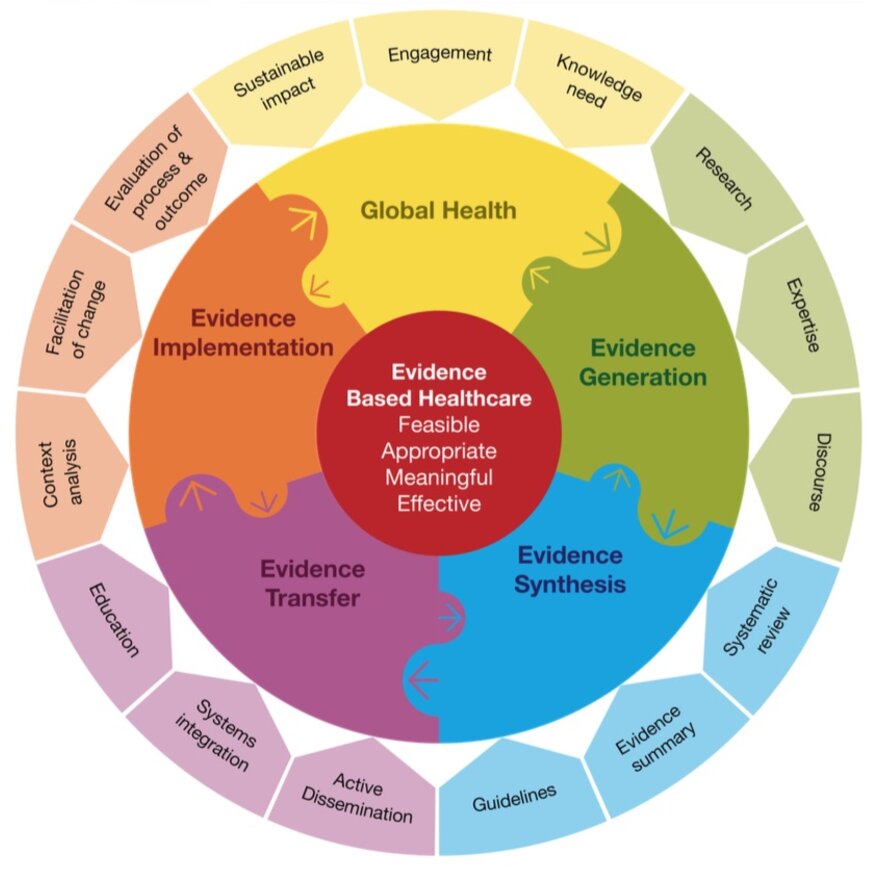About the Centre
The Centre for Evidence-Based Public Health aims to promote and support the development and application of evidence synthesis to ensure evidence-based decisions, policy changes and actions that strengthens the health and well-being of populations.
Who are we?
On 4 December 2018, The Centre for Evidence-Based Public Health became an affiliated group and member of the international JBI Collaboration. The Centre is based at the Department of Public Health Science at the Norwegian University of Life Sciences (NMBU), and is the first group in Norway affiliated to JBI, and the third in a Nordic country.
The Centre is concerned with appraising the determinants of health, including individual, social and environmental factors, as well as cultural and structural conditions, mainly nationally but also globally. We strive to provide evidence-based information to different public health issues that can promote sustainable development and the health and well-being of populations.
The JBI methodology and tools provide rich opportunities for the generation, synthesis and implementation of evidence for strengthening public health efforts. By applying JBI methodologies, faculty members and students at the Norwegian University of Life Sciences can promote the development and application of knowledge to ensure evidence-based decisions, policy changes and actions. The Centre further endeavours to promote the use of the JBI approach within the Norwegian academic context. The core members of the Centre have mixed academic backgrounds and diverse research experience, making the Centre highly interdisciplinary.
The JBI Model of evidence-based healthcare

JBI model Photo: JBI JBI and the JBI Collaboration
JBI is a global organisation promoting and supporting evidence based decisions that improve health and health service delivery.
JBI is driven to improving health outcomes in communities globally by promoting and supporting the use of the best available evidence to inform decisions made at the point of care.
This work begins and ends with the needs of those working in and using healthcare services.JBI responds to their questions and provides high quality, reliable information that is pragmatic and useful where it counts. This information is based on evidence that is feasible, appropriate, meaningful and effective to specific populations and settings. JBI achieves this by working with universities and hospitals from across the globe through the JBI Collaboration. In doing so JBI ensures that the research evidence we seek to synthesise, transfer and implement is culturally inclusive and relevant across the diversity of healthcare internationally.
JBI promotes and supports the sustainability of improved healthcare practice and health outcomes globally by developing and delivering a range of unique evidence-based resources, software, education and training.
The JBI approach
JBI's approach to evidence-based healthcare is unique. JBI considers evidence-based healthcare as decision making that considers feasibility, appropriateness, meaningfulness and effectiveness of healthcare practices.
The best available evidence, the context in which care is delivered, the individual patient and the professional judgement and expertise of the health professional inform this process. JBI regards evidence-based healthcare as a cyclical process: global healthcare needs, as identified by clinicians or patients/consumers, are addressed through the generation of research evidence that is effective, but also feasible, appropriate and meaningful to specific populations, cultures and settings.
This evidence is collated and the results are appraised, synthesised and transferred to service delivery settings and health professionals who utilise it and evaluate its impact on health outcomes, health systems and professional practice.
Research
Revisiting the conceptualization of social sustainability from a health promotion perspective: A scoping review.
Ånestad, R.M.; Nordbø, E.C.A.; Ihlebæk, C.
Article in press in Scandinavian Journal of Public Health. (2024)
Digital violence and abuse: A scoping review of adverse experiences within adolescent intimate partner.
Løkkeberg, R.; Ihlebæk, C.; Brottveit, G.; Del Busso, L.
Article in Trauma, Violence and Abuse; 25 (3), 1954-1965. (2024)
Can shopping centres foster wellbeing? A scoping review of motivations and positive experiences associated with non-shopping visits.
Pettersen, G.R.; Nordbø, E.C.A.; Ese, J.; Ihlebæk, C.
Article in Wellbeing, Space and Society, 4:100133. (2023)
Immigrant and ethnic minority patients` reported experiences in psychiatric care in Europe – a scoping review.
Kjøllesdal, M.K.R.; Iversen, H.K.H.; Skurdal, K.E.; Ellingsen-Dalskau, L.H.
Article in BMC Health Service Research, 23. (2023)
Nudge strategies for behavior-based prevention and control of neglected tropical diseases: A scoping review and ethical assessment
Velde FV, Overgaard HJ & Bastien S
Article in PLOS Neglected Tropical Diseases (2021)
Identifying nudge strategies for behavior-based prevention and control of neglected tropical diseases: A scoping review protocol
Velde FV, Longva J, Overgaard HJ & Bastien S
Article in JBI Evidence Synthesis (2020)
Promoting activity participation and well-being among children and adolescents: A systematic review of neighborhood built-environment determinants
Nordbø, E.C.A.; Nordh, H.; Raanaas, R.K.; Aamodt, G.
Article in JBI Evidence Synthesis (2020)
Resources
Resources provided by JBI:
- JBI Manual for Evidence Synthesis
- JBI Evidence Synthesis (journal)
- JBI Evidence Implementation (journal)
Master theses in public health science using review methodology
- Rapid review of public health messaging and community engagement initiatives during the COVID-19 pandemic in the Greater Mekong Subregion by Kaia Vedlog Kveen
- Utforming av intensivpoliklinikker for overlevende etter intensivbehandling - en scoping review by Anne Sofie Dæhlen
- Betydning av endring av fysiske omgivelser i nærmiljø: Et scoping review by Rebekka Hoff Muraas
- Psychedelic-assisted research for the treatment of drug and alcohol addiction. A scoping review by Susanne Ranheim Berg
- Faktorer som har betydning for amming blant skandinaviske kvinner: en rapid review by Ingrid Fossum Sagbakken
- The double disadvantage: a scoping review of labor market participation for people with disabilities from refugee backgrounds by Heidi Storeskar
- Fasilitatorer og barrierer for ungdoms deltakelse i friluftsliv: en scoping review by Marianne Kråkmo
- Pokémon Go, augmented reality (AR) and player engagement: Was it all a hype? A systematic review by Runar Werningsen Jenssen
- Sammenhengen mellom private, grønne utendørsarealer og helse: En litteraturstudie by Milan Markovic
Also refer to our research section
Contact us

